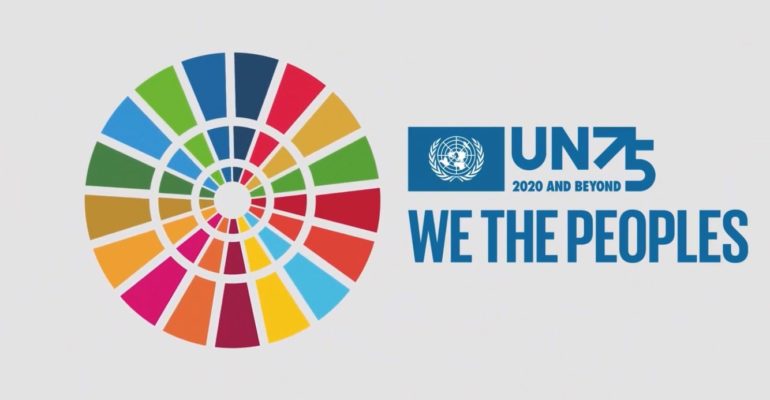10 January marked the 75 anniversary of the first United Nations (UN) General Assembly. To celebrate this momentous event, the UN hosted ‘We the Peoples’, a virtual conversation with the UN Secretary-General, António Guterres. The event kicked off with the UN Secretary-General’s first major speech of the year, in which he introduced the findings of the UN75 global survey.
In his speech, Guterrez praised the General Assembly’s longstanding history of formulating and upholding ground breaking laws on key global matters such as human rights, environmental protection, arms control and war crimes. However, he expressed a deep regret that the UN had failed to prevent the “war on nature” that has led to the current climate crisis. He described apocalyptic weather as “the new normal” which is leading to increasing numbers of displaced communities and rising rates of food insecurity, poverty, and inequality. The effect of these conditions is that geopolitical tensions are escalating. He urged countries to increase their efforts to work as a global community in order to tackle the climate crisis. For this to be achieved, Guterrez asserted that there needs to be more trust and inclusivity among the international community. Therefore, it seems, the UN’s relevance to today’s world lies in its ability to facilitate inclusive multilateralism and nurture the achievement of the Sustainable Development Goals.
Notably, Guterrez explained that “women’s leadership and equal participation are key ways to address the global challenges we face. The past year has highlighted the effectiveness of women’s leadership, adding to evidence that gender-balanced decision-making leads to stronger climate agreements, greater investment in social protection, longer-lasting peace, and more innovation”.
The speech proceeded to introduce the findings of the UN75 global survey. The survey’s 1.5 million participants were asked to identify what they believe are the key concerns in today’s world, and which of these should be made immediate or long-term priorities. Access to healthcare, safe water and sanitation, and education were all listed as key concerns, and participants called for the prioritisation of greater international solidarity and support for those in need. In fact, 97 percent of participants called for improved global cooperation to find multilateral solutions to today’s global challenges. Climate action was revealed as the top priority, followed by action to protect human rights, action to address conflict and corruption, and the promotion of sustainable and inclusive growth.
You can access the full report on the findings of the UN75 survey HERE. It is striking to note how unified participants were in their fears and hopes for the future and just how many of these relate to Soroptimist International’s advocacy efforts and community projects around the world. It is encouraging to see a global push towards the implementation of gender equality across all areas of development, including education, leadership, peace and security, healthcare, and digital technologies.
When asked what will be done to deliver these actions, Guterrez declared that the UN will respond by using its global voice to advocate for what is right, by convening countries in an effort to work together on these matters, and by encouraging the development of, and commitment to, binding international treaties that will ensure progress is made.
For more information on how the UN plans to respond to the voice of those who participated in the survey, please visit https://un75.online/take-action/.
The ‘We the Peoples’ event is available to view HERE via UN Web TV.
Feature image courtesy of UN75.

